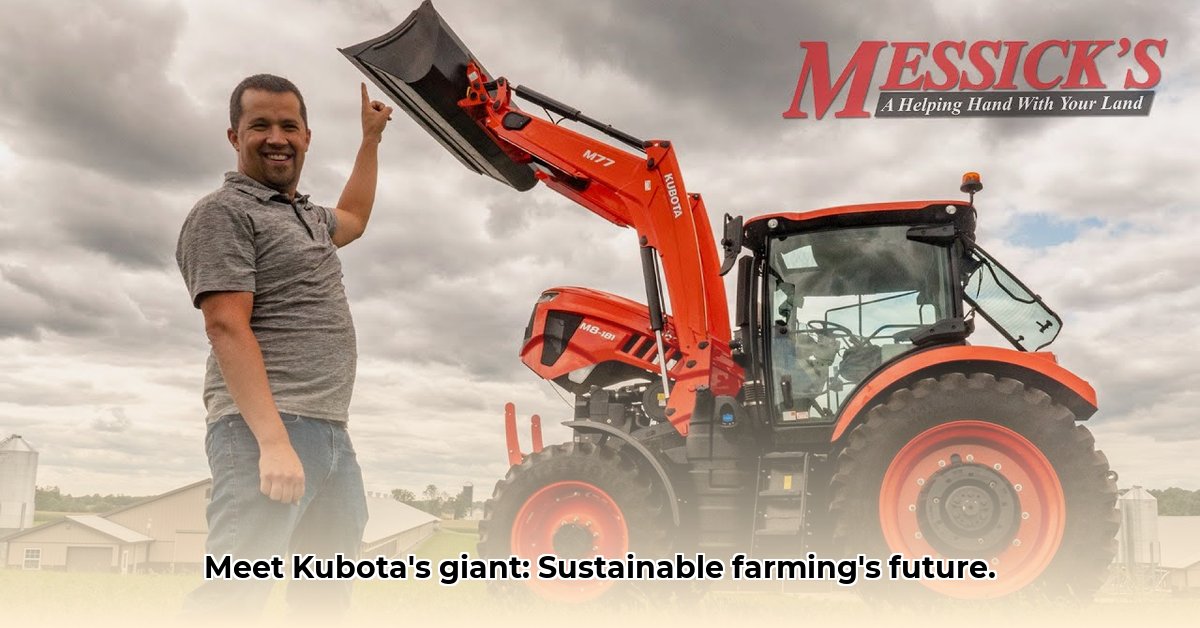
Kubota's newly released M8 series tractor represents a significant leap in agricultural technology. Boasting over 200 horsepower, it promises increased productivity, particularly for large-scale farming operations. However, the M8's impact on sustainable agriculture necessitates a nuanced examination of its efficiency gains against its potential environmental footprint and implications for all stakeholders. For more information on Kubota's previous models, check out the Kubota M4 Tractor.
The M8: A Deep Dive into Design and Features
The Kubota M8 is more than just increased horsepower; it incorporates design features aimed at maximizing efficiency and operator comfort. Its larger size allows for faster field work, potentially reducing fuel consumption per unit of output. Ergonomic design elements in the spacious cab minimize operator fatigue, improving productivity and safety. While specific fuel efficiency and emission data are still pending comprehensive testing and life cycle assessments (LCAs), initial indications suggest improvements over previous models, although their overall environmental impact requires further investigation. But the question remains: Does this translate to truly sustainable farming?
Environmental Considerations: Efficiency vs. Impact
While enhanced efficiency is promising, the M8's substantial power output raises concerns regarding fuel consumption and greenhouse gas emissions. A larger tractor inevitably requires more fuel, even with improved efficiency metrics. To accurately assess its sustainability, comprehensive LCAs are vital, tracing the environmental impact from manufacturing to disposal. This analysis is critical to fully understanding the trade-off between increased productivity and potential negative environmental consequences. Further research, particularly on long-term impacts and the use of sustainable fuels, is crucial for a complete picture.
Stakeholder Perspectives: A Multifaceted Impact
The M8's influence extends to various stakeholders within the agricultural landscape:
- Kubota: The M8 represents a significant investment in R&D and positions Kubota as a leader in high-power agricultural machinery. However, it also necessitates navigating increasingly stringent environmental regulations.
- Large Farms: Large-scale operations stand to benefit from the M8's enhanced productivity, leading to lower operating costs and increased yields. However, the significant upfront investment requires careful financial planning.
- Small Farms: Access to this technology may be limited due to the substantial cost and scale. Innovative financing models, such as leasing or cooperative ownership, could potentially bridge this gap and ensure equitable access to advanced agricultural technologies.
- Government Agencies: Governments benefit from increased domestic food production, but also face the challenge of incentivizing sustainable practices and addressing the potential environmental impact of large machinery.
- Consumers: While increased efficiency might lead to reduced food prices, the long-term impact on the environment remains a crucial consideration for consumers concerned about sustainability.
Mitigating Environmental Impact: A Collaborative Approach
Reducing the environmental footprint of the M8 requires a multi-pronged strategy:
- Precision Farming Technologies: Implementing GPS-guided systems and other precision agriculture tools minimizes resource waste, reducing fuel consumption and fertilizer application.
- Fuel Efficiency Best Practices: Proper tractor maintenance, optimal tire pressure, and efficient field management strategies are critical to maximizing fuel efficiency.
- Alternative Fuel Exploration: Investigating biodiesel and other renewable fuels can significantly decrease reliance on fossil fuels and lower greenhouse gas emissions.
- Responsible Usage Practices: Minimizing idling time and selecting appropriate implements for specific tasks further contribute to reduced fuel consumption and emissions.
- Lifecycle Assessment (LCA) Studies: Comprehensive LCAs are essential to accurately assess the overall environmental impact of the M8 throughout its entire lifespan.
Conclusion: The Path to Sustainable Agriculture
The Kubota M8 presents a complex picture. While its enhanced efficiency offers significant potential for increased productivity, addressing its environmental impact is equally vital. A collaborative effort, involving Kubota, farmers, governments, and consumers, is necessary to ensure responsible implementation and maximize benefits while mitigating negative consequences. The journey towards sustainable agriculture requires a continuous commitment to innovation, responsible practices, and comprehensive research. The M8 represents a powerful step forward, but realizing its potential while safeguarding our planet requires a thoughtful and collaborative approach.